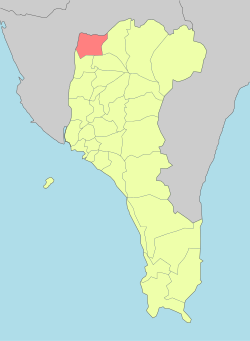Ligang (original) (raw)
22°48′04.1″N 120°30′25.1″E / 22.801139°N 120.506972°E / 22.801139; 120.506972
Rural township
| Ligang Township里港鄉 | |
|---|---|
| Rural township | |
 |
|
 Ligang Township in Pingtung County Ligang Township in Pingtung County |
|
 |
|
| Location | Pingtung County, Taiwan |
| Area | |
| • Total | 69 km2 (27 sq mi) |
| Population (February 2024) | |
| • Total | 25,582 |
| • Density | 370/km2 (960/sq mi) |
Ligang Township Office
Ligang Township (Chinese: 里港鄉; pinyin: Lǐgǎng Xiāng; Wade–Giles: Li3-kang3 Hsiang1) is a rural township in Pingtung County, Taiwan.[1] The area is the site of the market town 阿里港 (A-li-kang).[2]
Scottish Presbyterian missionary William Campbell visited 阿里港 (A-li-kang) in the mid-1870s.[3]
It has a population total of 25,582 and an area of 68.92 square kilometres (26.61 sq mi)
Administrative divisions
[edit]
Villages in Ligang Township
The township comprises 14 villages: Chaocuo, Chunlin, Daping, Guojiang, Jiadong, Mili, Sanbu, Talou, Tiedian, Tuku, Yongchun, Yutian, Zaixing and Zhonghe.
- ^ "里港鄉公所".
- ^ 臺灣歷史地圖 增訂版. [_Taiwan Historical Maps, Expanded and Revised Edition_]. Taipei: National Museum of Taiwan History. February 2018. p. 71. ISBN 978-986-05-5274-4. 阿里港 里港鄉
- ^ William Campbell (1915). "Sketches from Formosa". p. 24. Our next halting-place was in the market-town of A-li-kang, about twelve miles northward from Pi-thau. There we spent the Sabbath, and there our worthy Chinese colleague received a most hearty welcome from the brethren. He seemed to have great power in speaking to them at our forenoon service. I noticed the crowded audience sitting spell-bound under his long and stimulating discourse ; and no wonder, for the preacher displayed a remarkable fulness of knowledge regarding the beliefs, the customs, and the needs of the people before him. Whilst listening to him, one could not but feel the importance of having an educated native ministry in every part of China. Men like Pastor lap are able to adapt themselves in a way the missionary can never do, and to overcome difficulties which must always hamper any mere sojourner in the country. The afternoon meeting took the form of a Communion service, presided over by Mr. Ritchie. Between fifty and sixty adult members were present and partook of the sacred symbols. I had little effort in following the greater part of Mr. Ritchie's most suitable address ; and, altogether, the occasion was one to be remembered, a time when the presence of the Beloved Himself imparted new strength and melted the soul into gratitude and joy unspeakable.

